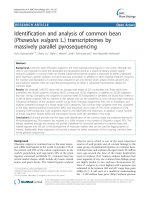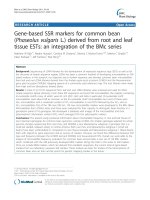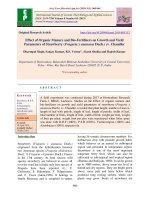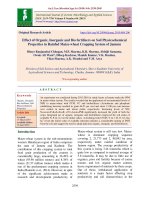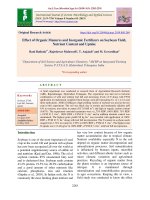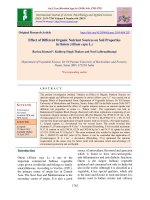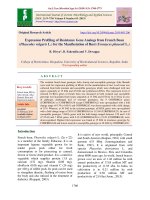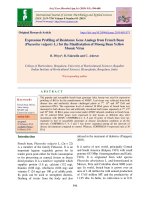Effect of different levels of bulky organic manures with chemical fertilizers on soil properties of French bean (Phaseolus vulgaris L.) variety arka komal
Bạn đang xem bản rút gọn của tài liệu. Xem và tải ngay bản đầy đủ của tài liệu tại đây (243.59 KB, 8 trang )
Int.J.Curr.Microbiol.App.Sci (2020) 9(8): 3077-3084
International Journal of Current Microbiology and Applied Sciences
ISSN: 2319-7706 Volume 9 Number 8 (2020)
Journal homepage:
Original Research Article
/>
Effect of Different Levels of Bulky Organic Manures with Chemical
Fertilizers on Soil Properties of French Bean (Phaseolus vulgaris L.)
Variety Arka Komal
K. Gangadharappa Gari Shilpa*, Narendra Swaroop and Arun A. David
Department of Soil Science and Agricultural Chemistry, Sam Higginbottom University of
Agriculture, Technology and Science, Prayagraj – 211007, Uttar Pradesh, India
*Corresponding author
ABSTRACT
Keywords
N P K,
Vermicompost,
Farm yard manure
and soil physiochemical properties
Article Info
Accepted:
24 July 2020
Available Online:
10 August 2020
A field experiment was conducted during the Rabi season 2019-2020 on sandy loam soil to
-study the effect of different levels of bulky organic manures with chemical fertilizers on
soil properties of French bean. Organic and inorganic nutrients are important for crop
productivity and soil health. The trial was conducted at Department of Soil Science and
Agricultural Chemistry, Naini Agricultural Institute, Prayagraj – 211007. The
experimental layout was done in a Randomized block design with 9 treatments replicated
three times. The results shown that application of 100% vermicompost significantly
enhanced the physical parameters., viz. % pore space, water retaining capacity (%),
specific gravity., organic carbon (%) and there was reduced bulk density (Mg m -3) along
with particle density (Mg m-3) and application of 50% RDF + 25% FYM + 25%
vermicompost gave good results in terms of chemical parameters viz. pH, electrical
conductivity (dSm-1), available N, P and K (kg ha-1). The present study reveals that
combined application of organic manures and inorganic fertilizers gave best results in
terms of soil chemical parameters. Whereas, application of 100% vermicompost without
any chemical fertilizer as given the positive outcome in terms of soil physical parameters
including organic carbon.
Introduction
French bean (Phaseolus vulgaris L.) is
considered as one of the most important
vegetable crop in the world which is grown
for its tender pods with high protein, calcium
and iron content. French bean is one of the
most important leguminous vegetable grown
in a commercial scale in all types of soils
ranging from sandy loam to clay soils with
pH 5.5 – 6.
The long term utilization of inorganic
fertilizers will damage the soil physical,
chemical and biological properties and causes
environmental pollution. Organic manures act
as a source of nutrients, organic matter and
also improve the microbial population along
with physical, chemical and biological
parameters of the soil (Manivannan et al.,
2009). Organic manures are eco-friendly,
cheap source of nutrients and are potentially
sound for Supplying nutrients which can
3077
Int.J.Curr.Microbiol.App.Sci (2020) 9(8): 3077-3084
reduce dependence on chemical fertilizers
(Datt et al., 2013). Inadequate use of the
organic manures has rendered Indian soils
deficient in macro and micro nutrients
(Acharya and mandal, 2002).
Vermicompost is the microbial composting of
organic wastes through earthworm activity to
form organic fertilizers which contain higher
level of organic matter, organic carbon, total
and available N, P, K and micronutrients,
microbial
and
enzyme
activities
(Ranganathan, 2006; Parthasarathi et al.,
2007). FYM, the most commonly and widely
used organic nutrient is a rich source of
primary, secondary and micronutrient to the
plant growth. It is the constant source of
energy for heterotrophic microorganisms that
helps in increasing the availability of
nutrients, and thereby improves the quantity
and quality of crop production (Dixit and
Gupta, 2000)
Judicious use of manures with chemical
fertilizers improves soil physical, chemical
and biological properties and improves crop
productivity (Singh and Singh, 2012). Due to
excess and in judicial use of inorganic
fertilizers alone, the soil physical parameters
will be damaged, soil micro fauna population
will be disturbed and accumulation of soil
pollutants will shoot up.
This problem can be mitigated with the use of
organic manures along with recommended
dosage of inorganic fertilizers. Considering
these problems, the present study was
conducted with the combination of bulky
organic manures along with the different
doses of inorganic fertilizers.
Materials and Methods
Experimental site
The experiment was conducted during Rabi
season 2019-2020 in the research farm of
Department of Soil Science and agricultural
chemistry, Sam Higginbottom University of
Agriculture, Technology and Sciences,
Prayagraj which situated six km away from
Prayagraj city on the right bank of Yamuna
river, the experimental site is located in the
sub-tropical region with 250N latitude
81.500E longitude and 95m mean sea level.
Prayagraj district represents the subtropical
belt of the South East of Uttar Pradesh, and is
endowed with extremely hot summer and
fairly cold winter.
The maximum temperature of the location
ranges between 46ᵒC - 48ᵒC and seldom falls
below 4ᵒC - 5ᵒC. The relative humidity ranges
between 20-94%. The average rainfall of this
area is around 1100mm annually.
Soil sampling
The soil samples were randomly collected
from 0-15cm depths prior to tillage
operations, the size of the soil sample was
reduced to required quantity by conning and
quartering method.
The composites soil sample was air dried and
passed through 2 mm sieve. The composite
sample was utilized for physical and chemical
analysis.
Design and treatments
The experiment was carried out in
randomized block design with 9 treatments
replicated three times. The treatment
combinations laid out as, T1– Absolute
control, T2– 100% N.P.K.,T3– 100%
Vermicompost, T4– 100% Farm yard manure,
T5– 50% N.P.K.+ 50% Vermicompost, T6–
75% N.P.K. + 25% Vermicompost, T7– 50%
N.P.K. + 50% Farm yard manure, T8– 75%
N.P.K. + 25% Farm yard manure, T9– 50%
N.P.K. + 25% vermicompost + 25% Farm
yard manure
3078
Int.J.Curr.Microbiol.App.Sci (2020) 9(8): 3077-3084
Fertilizer application
The fertilizers were weighed and applied in
the plots and mixed thoroughly with soil. The
recommended dose of NPK was 120 kg N, 80
kg P2O5and 50 kg K2O, was given through
different sources i.e. Urea, DAP, MOP, FYM
and vermicompost as per design of the
experiment. Full dose of P & K was applied
through DAP and muriate of potash (MOP) as
a basal dose. Organic manures such as FYM
(20t ha-1) and vermicompost (10t ha-1) were
applied 5 days before sowing. Nitrogen
through urea was applied in two equal splits
doses i.e. first at the time of sowing and
second dose at 20 DAS.
Results and Discussion
Soil quality can be monitored by a set of
measurable attributes termed indicators.
These indicators can be broadly grouped as
physical and chemical indicators and one can
assess overall soil quality by measuring
changes in these indicators (Sahrawat and
Narteh 2002; Tripathi et al., 2012). In the
present study the fallowing results of different
physic chemical characters which were
influenced by application of bulky organic
manures and chemical fertilizers have been
recorded (Fig. 1–4 and Table 1).
Physical properties of soil
The application of different manures with
Chemical fertilizer produced remarkable
effect on soil physical properties is presented
in Table 2. Application of 100%
Vermicompost significantly increased the
pore space (54.56%), water retaining capacity
(65%) and specific gravity (2.26) respectively
compared to absolute control and this
application reduced the bulk density (1.01 Mg
m-3) and particle density (2.51 Mg m-3) of soil
and particle density have non-significant
effect on different treatments. Similar
findings were also obtained by Hossein et al.,
2007, Rasool Azarmi et al., 2008, Chenping
Xu et al., 2016 and Aysha et al., 2017.
Table.1 Physio-chemical analysis of soil prior to sowing of French bean
Particulars
Bulk density (Mg m-3)
Particle density (Mg m-3)
Pore space (%)
Water holding capacity
(%)
Specific gravity
Soil color
Soil texture Sand
Silt
Clay
pH (1:2)
EC (dS m-1at 25°C)
Organic Carbon (%)
Available N (kg ha-1)
Available P (kg ha-1)
Available K (kg ha-1)
Method employed
Copper core (Muthuaval et al., 1992)
Graduated measuring cylinder (Muthuaval et al., 1992)
Graduated measuring cylinder (Muthuaval et al., 1992)
Graduated measuring cylinder (Muthuaval et al., 1992)
Result
1.24
2.66
56
58
Graduated measuring cylinder (Muthuaval et al., 1992)
Munsell colour chart (Albert henry munsell 1971)
Bouyoucos hydrometer ( Bouyoucos 1927)
2.21
10YR6/4
Sandy loam
65.41
21.12
13.74
7.6(slightly
saline)
0.16
0.60 (medium)
288 (medium)
22.6 (medium)
196 (medium)
Glass Electrode pH Meter (Jackson, 1958)
Conductivity Bridge Meter (Wilcox, 1950)
Wet oxidation (Walkley and Black ( 1947)
Alkaline Permanganate (Subbiah and Asija, 1956)
Calorimetric method (Olsen et al., 1954)
Flame Photometer method (Toth and prince 1949)
3079
Int.J.Curr.Microbiol.App.Sci (2020) 9(8): 3077-3084
Table.2 Effect of different levels of bulky organic manures with chemical fertilizers on physical
properties of soil
Treatments
Bulk
density
(Mg m-3)
Particle
Density
(Mg m-3)
Pore space
(%)
T1
1.21
2.67
44.6
51.66
2.03
T2
1.17
2.61
47.4
54.73
2.08
T3
1.01
2.51
54.56
65
2.26
T4
1.02
2.54
52.96
64.3
2.22
T5
1.04
2.56
51.36
63.91
2.06
T6
1.12
2.59
49.61
59.39
2.09
T7
1.03
2.58
49.75
60.70
2.07
T8
1.15
2.60
49.14
56.98
2.13
T9
1.02
2.57
50.33
63.49
2.18
S
NS
S
S
S
S.em (+-)
0.09
0.034
1.13
0.84
0.03
CD (P=0.05)
0.05
0.10
3.34
2.47
0.09
F-test
Water
retaining
capacity (%)
Specific
gravity
Table.3 Effect of different levels of bulky organic manures with chemical fertilizers on chemical
properties of soil
Treatments
pH
EC (dSm-1)
Organic
carbon (%)
Available N
(kg ha-1)
Available P
(kg ha-1)
Available K
(kg ha-1)
T1
7.89
0.17
0.46
225.33
16.23
112.66
T2
7.81
0.22
0.51
238.33
17.24
161.66
T3
7.7
0.18
1.005
259.34
17.36
142.34
T4
7.58
0.19
0.82
278.35
18.2
144.3
T5
7.65
0.21
0.77
281.66
19.26
166.67
T6
7.77
0.2
0.70
278.67
19.4
165.32
T7
7.79
0.19
0.72
297.68
20.3
168.31
T8
7.76
0.21
0.62
277.7
21.33
174.3
T9
7.5
0.23
0.73
307.4
22.16
189.67
F-test
S
S
S
S
S
S
S.em (+-)
0.03
0.01
0.04
1.55
0.16
0.84
CD (P=0.05)
0.091
0.03
0.12
4.55
0.49
2.47
3080
Int.J.Curr.Microbiol.App.Sci (2020) 9(8): 3077-3084
Fig.1 Effect of different levels of bulky organic manures with chemical fertilizers on Bulk
density (Mg m-3), Particle density (Mg m-3) and specific gravity
3
2.5
2
bulk density
1.5
particle density
1
specific gravity
0.5
0
T1 T2 T3 T4 T5 T6 T7 T8 T9
Fig.2 Effect of different levels of bulky organic manures with chemical fertilizers on pore space
(%) and water retaining capacity (%)
70
60
50
Pore space (%)
40
30
Water retaining
capacity (%)
20
10
0
T1 T2 T3 T4 T5 T6 T7 T8 T9
Fig.3 Effect of different levels of bulky organic manures with chemical fertilizers on EC (dSm-1)
and organic carbon (%)
1.2
1
0.8
EC (dSm-1)
0.6
Organic carbon
(%)
0.4
0.2
0
T1 T2 T3 T4 T5 T6 T7 T8 T9
3081
Int.J.Curr.Microbiol.App.Sci (2020) 9(8): 3077-3084
Fig.4 Effect of different levels of bulky organic manures with chemical fertilizers
on available N, P and K. (kg ha-1)
350
300
250
200
150
100
50
0
nitrogen
phosphorus
potassium
T1 T2 T3 T4 T5 T6 T7 T8 T9
soil (Manivannan et al., 2009, Albiach et al.,
2000).
Chemical properties of soil
Perusal of data in table 3 reveals that,
application
of
100%
Vermicompost
significantly improved the percentage of
organic carbon (1.005%) compared with
control plot Rasool Azarmi et al., 2008, Sruti
Karmakar et al., 2013 and Chenping Xu et al.,
2016. Application of 50% NPK + 25% FYM
+ 25% Vermicompost significantly enhanced
the EC (0.23dSm-1), available nitrogen
(307.4kg ha-1), available phosphorus (22.16kg
ha-1) and available potassium (189.67kg ha-1)
in soil when it is compared with untreated
plot. Similar results were also reported by
Aphale et al., 2005, Akash swamy et al., 2017
and Dhaka et al., 2016. The highest pH (7.89)
was recorded in untreated plot whereas; the
lowest pH (7.5) observed with treatment T950% N.P.K + 25% FYM +25%
Vermicompost. Similar findings were
reported by Meena et al., 2016.
Application of organic manures decreases the
bulk density of soil, organic manures mainly
contributed to higher organic matter content
of soil because of higher microbial activities
which leads to better aggregation of soil
(Pawan kumar et al., 2018). Addition of
organic manures will have a positive
relationship with pore space, water holding
capacity, bulk density and particle density of
Likewise, significant improvements in
fertility status of the soils due to addition of
FYM and vermicompost have also been
reported by Roy et al., (2001). Anwar et al.,
(2005) also reported tremendous increase in
organic carbon, Available N, P and K may
due
to
combined
application
of
vermicompost, FYM and inorganic fertilizers.
Decrease in soil pH may be due to formation
of bicarbonates and ammonium nitrate by the
application of urea that reacts with hydrogen
ions which causes reduction in acidity.
The findings of the experiment concluded that
the combined application of organic manures
and inorganic fertilizers i.e. 50% NPK + 25%
FYM + 25% Vermicompost improves the soil
chemical parameters. Whereas, with the
application of 100% vermicompost best
results obtained in terms of soil physical
parameters including organic carbon.
Acknowledgement
The Authors are thankful to Department of
Soil Science and agricultural chemistry,
SHUATS, Naini agricultural institute,
Prayagraj, for taking their keep interest and
encouragement to carry out the research work.
3082
Int.J.Curr.Microbiol.App.Sci (2020) 9(8): 3077-3084
Conflict of interest
The authors declare that they have no conflict
of interest.
References
Akash Swamy., David A.A., Madhu, B.M.,
and Soman Singh Dhruw., 2017.
Response of inorganic fertilizers and
FYM on physico chemical properties of
soil of yellow mustard (Brassica
campestris L.) cv. Ulhas. Journal of
Pharmacognosy and Phytochemistry,
6(5):871-873.
Aysha siddika, M. M., Jeyamangalam, F.,
2017. Short term effect of organic
manure on the physical and chemical
properties of soil. International journal
of trend in research and development.
Page 35-37.
Chenping Xu., and Beiquan Mou., 2016.
Vermicompost Affects Soil Properties
and Spinach Growth, Physiology, and
Nutritional Value. Horticulture science.
51(7):847–855.
Datt, N., Dubey, Y. P., and Rohina
Chaudhary., 2013. Studies on impact of
organic, inorganic and integrated use of
nutrients on symbiotic parameters,
yield, quality of French-bean (Phaseolus
vulgaris L.) vis-à-vis soil properties of
an acid alfisol, Asian journal of
agricultural research, 8(22): 26452654.
Hossein Moradi., Mohammad Fahramand.,
Alireza
Sobhkhizi.,
Mohammad
Adibian,
Mohsen
Noori.,
Shilaabdollahi., and Khashayar Rigi.,
2014. Effect of vermin compost on
plant growth and its relationship with
soil properties. International Journal. of
Farming and Allied Sciences. Vol.,
3(3): 333-338.
Manivannan
S.,
Balamurugan
M.,
Parthasarathi K., Gunasekaran G. and
Ranganathan L.S., 2009. Effect of
vermicompost on soil fertility and crop
productivity - beans (Phaseolus
vulgaris) Journal of Environment
Biologty, 30(2), 275-281
Meena, L. R., Singh, R. K. and Gautam, R.
C., (2003)Yield and nutrients uptake of
chickpea as influenced by moisture
conservation practices, phosphorus
levels and bacterial inoculation. Legume
Research., 26(1): 109-112
Parthasarathi, K., Ranganathan, L.S., Anandi,
V., and Zeyer J., 2007. Diversity of
microflora in the gut and casts of
tropical composting earthworms reared
on different substrates. Journal of
Environmental Biology. 28:87-97.
Pawan kumar pant., and shri ram.,2018. Long
term manuring and fertilization effects
on soil physical properties after forty
two cycles under rice-wheat system in
north Indian mollosols, international
journal of current microbiology and
applied sciences, 7(7): 232-240
Rasool Azarmi., Mousa Torabi Giglou., and
Rahim Didar Taleshmikail., 2008.
Influence of vermicompost on soil
chemical and physical properties in
tomato (Lycopersicum esculentum)
field. African Journal of Biotechnology.
Vol. 7(14), pp. 2397-2401.
Sahrawat, K.L., Narteh, L.T., (2002), A
fertility index for submerged ricesoils,
Communications in Soil Science and Plant
Analysis, 33: pp 229–236.
Singh, Muneshwar., Mohan Singh., and
Kumra Wat., (2008). Influence of
nutrient supply systems on productivity
of soybean-wheat and soil fertility of
Vertisols of Madya Pradesh. Journal of
Indian Society of Soil Science,
56(4):436-441.
Sruti Karmakar., Koushik Brahmachari., and
Aniruddha
Gangopadhyay.,
2013.
Studies
on
agricultural
waste
management through preparation and
3083
Int.J.Curr.Microbiol.App.Sci (2020) 9(8): 3077-3084
utilization of organic manures for
maintaining soil quality. African
Journal of Agricultural Research. Vol.
8(48), pp. 6351-6358.
Tripathi A, Misra D. R 2012. A study of
physico-chemical properties and heavy
metals in contaminated soils of
municipal
waste
dumpsites
at
Allahabad, India, International Journal
of Environmental Sciences, Volume
2(4): 2031-2040.
How to cite this article:
Gangadharappa Gari Shilpa, K., Narendra Swaroop and Arun A. David. 2020. Effect of
Different Levels of Bulky Organic Manures with Chemical Fertilizers on Soil Properties of
French Bean (Phaseolus vulgaris L.) Variety Arka Komal. Int.J.Curr.Microbiol.App.Sci. 9(08):
3077-3084. doi: />
3084
